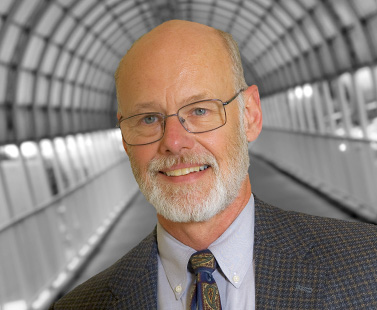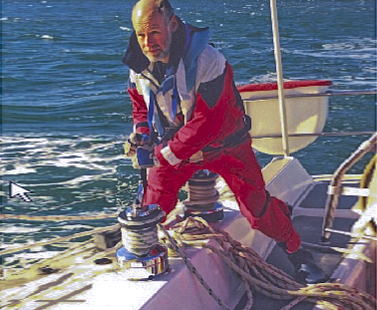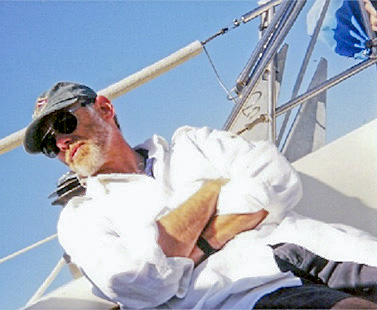Dr. Fabri to set sail in new directions

These are a few of the things Dr. Peter (Jeff) Fabri already plans to start doing next year, when he semi-retires:
Teach his grandson to ski; work on his boat, his bonsai and his gourmet cooking skills; get to know his soon-to-arrive second grandchild; fish more; listen to all the works of J.S. Bach.
And, for good measure, learn to play the mandolin.
To most people, this sounds like an ambitious list of goals.
Not to Dr. Fabri.
But then, Dr. Fabri is not most people. He’s winding down a multi-faceted career spent as a surgeon, dean and advisor to scores of students. He’s the kind of guy who gets a PhD in engineering on the side, is always impeccably dressed, and is an expert sailor to boot. Colleagues describe him as the ultimate Renaissance man.
So maybe it’s not surprising that Dr. Fabri insisted that these are not, in fact, goals.
“No more goals,” he joked. “I have lived all my life with goals.”
We shall think of them as relaxation activities.

Dr. Fabri training for an around-the-world race.
Dr. Fabri, 61, who has been associate dean of graduate medical education for 16 years, has decided to give up his administrative responsibilities at the end of the year. He plans to continue work on his research interests about three days a week.
Dr. Stephen Klasko, CEO of USF Health and dean of the USF College of Medicine, praised Dr. Fabri’s high standards and reputation for fairness.
“Jeff’s experience and judgment have been an invaluable help to me in moving our graduate programs forward,” he said. “Jeff’s principled leadership has been the glue that binds these programs together.”
Dr. Fabri is the first and only person to hold the job at the medical school.
“He put accountability and oversight in place,” said Dr. John Curran, associate vice president for academic and faculty affairs, as well as a charter faculty member at USF. “Before that, everyone did their own thing. He changed the culture.”
During that time, Dr. Fabri has overseen and expanded USF’s residency programs, which sprawl across Tampa Bay at several different hospitals. He’s helped re-institute the medical school’s orthopedics residency, which already is getting 500 applicants for four slots. He’s won praise from national experts by starting an unusual course in patient safety.
In addition to his work as a surgeon and serving as the associate dean for veterans’ affairs, Dr. Fabri has been a significant national voice for graduate medical education. He’s served on many national boards, including the Governing Council of the Section on Medical Schools of the American Medical Association, two steering committees of the Association of American Medical Colleges, and as the Designated Institutional Official to the Accreditation Council for Graduate Medical Education and to the National Resident Match Program.
“Jeff is one of the great guys around this place because he’s always willing to pitch in to do something to benefit students,” said Dr. Steven Specter, associate dean for student affairs.
Dr. Fabri in the classroom, 1990.
Dr. Fabri always takes time to help senior medical students who are graduating out of cycle or having trouble finding a residency to match to, Dr. Specter said.
“Even though his role is with residents, he’s always an advocate for students,” he said.
When he first became a doctor, Dr. Fabri didn’t plan to spend most of his career helping young doctors learn. But when the opportunity arose, he thought it would be a way for him to learn as well.
“I don’t think I’ve ever turned down an opportunity to learn something new,” Dr. Fabri said.
That chance, some 34 years ago, turned into a career devoted to graduate medical education.
Dr. Fabri would like to see more teaching that brings together students from different disciplines. During his career, he’s mentored medical students and residents. But he’s also advised doctoral students in biochemistry, education, psychology, and engineering, as well as graduate students in nursing and physician assistants. He and a colleague recently started an innovative patient safety course open to students from many fields.
“If you pay attention to what you’re doing, all these students have something to contribute – and that is not the way medical education has been taught,” Dr. Fabri said. “Medical education has been taught as the exclusive purview of physicians. But I’ve learned there’s a lot we can learn from other people.”
Others have learned a lot from him. Dr. Bryan Bognar, associate professor of internal medicine, has known Dr. Fabri for years as a colleague. But Dr. Bognar also knows Dr. Fabri as a teacher, since he took Dr. Fabri’s safety course last year, when he was completing his MPH degree.
“He’s one of the smartest people I know,” Dr. Bognar said. “I want to be just like him when I grow up.”
What impresses Dr. Bognar the most is that Dr. Fabri keeps stretching. Dr. Bognar pointed to Dr. Fabri’s pursuit of his PhD as an example.
“He has a way of keeping himself out of his comfort zone,” Dr. Bognar said. “It would be so easy for someone like Jeff to sit back and rest on his achievements. Getting his PhD speaks volumes about Jeff.”
Dr. Curran also remarked on the range of Dr. Fabri’s talents, calling him “one of the brightest and widest minds at this institution.”
“I call him my favorite Boy Scout,” Dr. Curran added. “He always wants to do the right thing.”
Every program has its own challenges, and at USF, that challenge for Dr. Fabri has been running residency programs at so many different hospitals, separated by several miles, each with their own way of doing things.
“There’s a micro-culture at each (hospital) institution,” Dr. Fabri said. “So trying to maintain an (educational) institutional culture is very difficult. It requires constant work.”
But what Dr. Fabri is most proud of is achieving that unity of purpose and mission.
“I believe that we have a real culture of graduate medical education as an institution, that has overcome the geographic boundaries and transcended the differences,” he said. “A large part of that is because we have crafted a set of principles that have allowed us to make consistent decisions and have a consistent direction.”

A rare moment: at rest.
Starting Jan. 1, Dr. Fabri will move in a different direction. He’ll cut back to working three days a week, doing research on health systems engineering. He’ll study ways to make health care safer, more effective and more efficient.
“I hope to make a difference,” he said.
And the mandolin?
Dr. Fabri’s sister gave him one – “a very nice mandolin” – as a wedding gift almost 40 years ago. He’s kept it for decades without learning to play it.
“I’ve never had time,” he said.
We wonder why.
— Story by Lisa Greene, USF Health Communications
— Lead photo by Eric Younghans, USF Health Communications; sailing photos courtesy of Dr. Fabri; classroom photo, USF Health archives
RELATED STORIES:
– Dr. Paidas fills new roles in Graduate Medical Education, Clinical Affairs
– Dr. Brock named Associate Dean for VA Affairs


